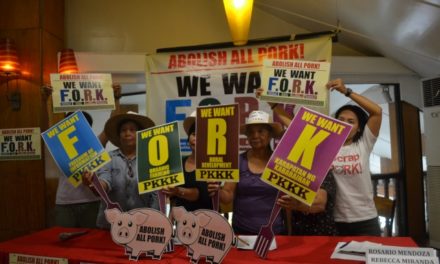Speech delivered by Mary Ann Manahan, a water justice activist based in the Philippines during the press conference of the Peoples’ Water Forum at Marmara Hotel, Istanbul, Turkey on March 19, 2009. She spoke on behalf of the Asian delegation present at the Peoples’ Water Forum.
Asia’s water resources are described as a paradox. One of abundance—we are home to tremendous water resources: great rivers systems and lakes in Tibet, India, Southeast Asia, and China. But at the same time, of scarcity— we have the highest number of people unserved by either water supply or sanitation. 715 million people in Asia have no access to safe drinking water, while 1.9 billion or close to 50% of its population has no access to sanitation. This scarcity has provoked water wars in communities and interstate conflicts between China, the Mekong region, India and Pakistan who are fighting on transboundary issues, water sharing, and dam constructions.
This water crisis has become a staging point for the IFIs such as the ADB and WB and neoliberal governments to promote and push privatization as the so-called “best model” that will solve the region’s water crisis. For the last 10-15 years, we have been the guinea pigs and laboratories of privatization experiments. But these have miserably failed and promises were not delivered. We saw in Metro Manila and Jakarta skyrocketing of prices, inefficient delivery, exacerbating unequal access to water and sanitation between the poor and the rich, untransparent and unaccountable water systems. The promise that the private is better than the public is completely untrue.
The impacts of the privatization and commercialization of water to communities and the poor have led the water justice movements to wage struggles against the privateers, local and transnational water barons, and water policies of Asian governments. Our struggles are struggles for human right, human dignity, gender equity, and ultimately, democracy. Our struggles have brought about the emergence of alternatives such as Public-Public Partnerships, communities reclaiming and taking control over their water, as well as the reversal of privatization and the establishment of democratically and publicly controlled and managed water systems. In the Philippines, neighborhood associations in slum communities are laying down pipes and boring wells to provide water and sanitation facilities to their communities. In the state of Tamil Nadu, India, they were able to transform a moribund and corrupt public water utility into one of the most efficient and functioning utilities in the region and where public engineers are working with and alongside communities.
These positive models and good practices have to be supported and strengthened by state and public investments rather than outright support to privatization.
We demand and challenge our governments in Asia to say no to the IFIs conditionalities and drive for privatization and commercialization of water, particularly, through free trade agreements and to put a stop to risky dam constructions.
We demand our Asian governments, especially the regional blocs such as ASEAN and SAARC, to be bold and voice out their support for human right to water. As duty bearers they must work for the protection and fulfillment of the right to water, including the promotion and support for community stewardship. Their silence on this issue in the official World Water Forum is not only disconcerting, it’s an outright abdication of their roles and responsibilities to the people.
We challenge you to stand up and not be part of the silent majority.
We challenge and urge you to be part of the lasting solution to world’s water problems. If not, we will hold you accountable.

![[Press Release] Landmark conference on land grabbing: large-scale agricultural investments do undermine food security](https://focusweb.org/wp-content/themes/Extra/images/post-format-thumb-text.svg)



![[IN PHOTOS] In Defense of Human Rights and Dignity Movement (iDEFEND) Mobilization on the fourth State of the Nation Address (SONA) of Ferdinand Marcos, Jr.](https://focusweb.org/wp-content/uploads/2025/07/1-150x150.jpg)

